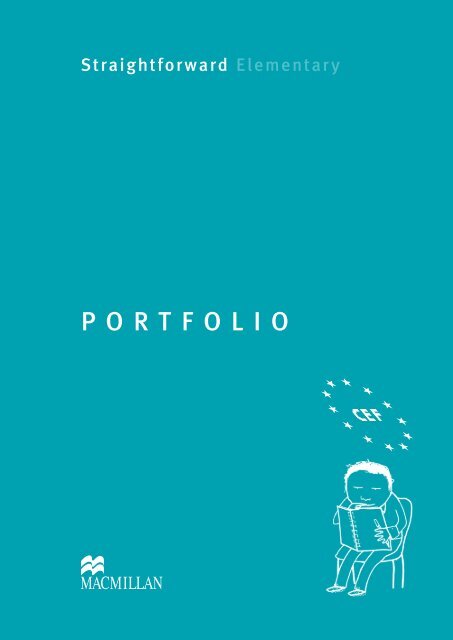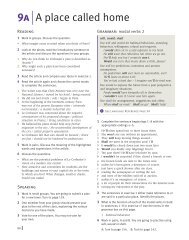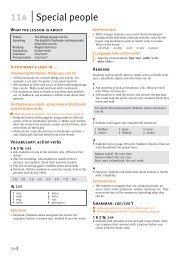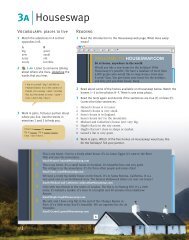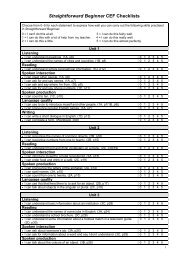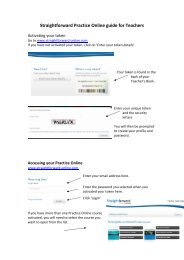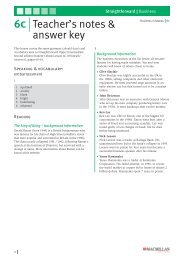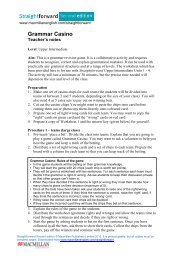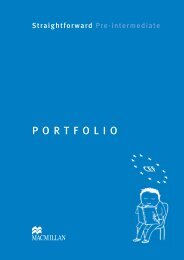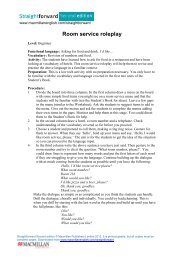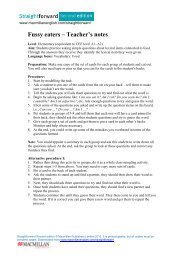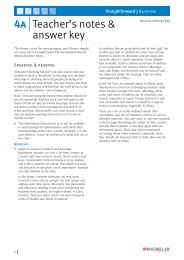Elementary Portfolio - Straightforward
Elementary Portfolio - Straightforward
Elementary Portfolio - Straightforward
You also want an ePaper? Increase the reach of your titles
YUMPU automatically turns print PDFs into web optimized ePapers that Google loves.
★<br />
★<br />
<strong>Straightforward</strong> <strong>Elementary</strong><br />
PORTFOLIO<br />
★<br />
★ ★<br />
★<br />
★<br />
★<br />
CEF<br />
★<br />
★<br />
★<br />
★
Jim Scrivener & Tim Bowen<br />
<strong>Straightforward</strong> <strong>Elementary</strong><br />
PORTFOLIO
Contents<br />
Welcome to your <strong>Straightforward</strong><br />
<strong>Elementary</strong> <strong>Portfolio</strong><br />
page<br />
Before you start<br />
Me 3<br />
Language passport 4–5<br />
My English 6<br />
Needs analysis 7<br />
During the course<br />
Diary 8–57<br />
At the end of the course<br />
Can you remember? 58<br />
My grammar now 59<br />
Now I can ... 60<br />
The way forward 61<br />
Goodbye! 62<br />
My dossier 63<br />
Answers 64
Me<br />
Describe yourself<br />
Complete the text to make a true description of yourself.<br />
My name is and I’m years<br />
old. When you meet me, you’ll see that I am<br />
and<br />
. My friends or colleagues say that<br />
I’m .<br />
Stick your<br />
photo here.<br />
I live in . It’s a very place. The most interesting<br />
thing in my town is .<br />
There are people in my family. I have sisters<br />
and<br />
brothers.<br />
In the future I want to because I .<br />
Things I like:<br />
Things I don’t like:<br />
My choices<br />
Circle the correct words and phrases for you.<br />
work or study?<br />
do some sport or play a computer game?<br />
pasta or rice?<br />
coffee or tea?<br />
sleep late or get up early?<br />
bath or shower?<br />
coffee or tea?<br />
read a book or watch a movie?<br />
chocolate or chips?<br />
3
Language passport<br />
My school/college<br />
I go/went to .<br />
The teacher who helped me most was my<br />
teacher.<br />
He/She .<br />
School subjects<br />
My most difficult subject is/was .<br />
My most interesting subject is/was .<br />
I would like to know more about .<br />
Examinations I passed:<br />
Qualifications I have:<br />
Is that question too<br />
difficult for you?<br />
No, the question<br />
is fine, but the<br />
answer...<br />
4
My languages<br />
My mother tongue is .<br />
What languages can you speak? Complete the table. (1 = just a little, 5 = fluently)<br />
Language:<br />
Speaking<br />
Writing<br />
Listening<br />
Reading<br />
Number of<br />
years studied<br />
1 2 3 4 5 1 2 3 4 5 1 2 3 4 5 1 2 3 4 5<br />
1 2 3 4 5 1 2 3 4 5 1 2 3 4 5 1 2 3 4 5<br />
1 2 3 4 5 1 2 3 4 5 1 2 3 4 5 1 2 3 4 5<br />
1 2 3 4 5 1 2 3 4 5 1 2 3 4 5 1 2 3 4 5<br />
These languages would be useful for me to learn in the future:<br />
Circle the best phrase to complete the sentences for you.<br />
I find it very easy / quite easy / quite difficult / very difficult to<br />
learn a language.<br />
I think that the most important thing in learning a language is to<br />
be able to speak / listen / read / write in the new language.<br />
The most difficult thing for me is speaking / listening /<br />
reading / writing.<br />
I would like to improve my pronunciation / spelling /<br />
vocabulary / grammar / fluency.<br />
‘<br />
Learn a new language. There will be millions<br />
’<br />
more people who could be your friend.<br />
5
My English<br />
I can do these things easily in English:<br />
These things are still very difficult for me:<br />
This grammar is studied at Common European Framework levels A1 & A2.<br />
How confident are you? (1 = I have problems with this. 2 = This is OK. 3 = I know this.)<br />
Grammar item For example 1 2 3<br />
A/an<br />
a cat, an exercise<br />
Regular & irregular plurals windows, women<br />
Verb to be<br />
I am a student. You aren’t Spanish.<br />
Is he 18?<br />
Possessive adjectives<br />
my, his, her<br />
Possessive ’s<br />
Jim’s car, the child’s book<br />
Prepositions of place<br />
on, next to, under<br />
Present simple affirmative She works at home.<br />
Present simple negative<br />
She doesn’t work at home.<br />
Present simple questions<br />
Does she work at home?<br />
& short answers<br />
Yes, she does.<br />
Wh- questions<br />
Where does she work?<br />
Frequency adverbs<br />
always, often, sometimes, never<br />
There is / there are<br />
There are three boxes.<br />
Past simple was/were<br />
They were late. She was angry.<br />
Past simple regular verbs<br />
walked, wanted, watched<br />
Past simple irregular verbs ate, went, saw<br />
Past simple questions<br />
What did you do last night?<br />
Prepositions of time<br />
at 10 o’clock, in May, on Thursday<br />
Can/can’t<br />
She can swim. He can’t.<br />
Present continuous<br />
She’s working, We’re cooking.<br />
Going to future<br />
I’m going to buy a DVD.<br />
6
Needs analysis<br />
English is important for me because<br />
I will need English in the future to<br />
.<br />
.<br />
Tick the boxes to show how important these things are for you.<br />
not<br />
quite<br />
very<br />
important<br />
Describe people and things<br />
Tell a story<br />
Express opinions and discuss topics<br />
Participate in meetings<br />
Make presentations<br />
Socialize in English<br />
Reserve hotels or book tickets<br />
Order food in restaurants<br />
Receive visitors<br />
Read newspaper and magazine articles<br />
Make telephone calls<br />
Read business or technical texts<br />
Read for enjoyment<br />
Understand information on the internet<br />
Understand presentations<br />
Understand movies and TV programmes<br />
Write and read notes and memos<br />
Write and read emails<br />
Write and read personal letters<br />
Write and read business letters<br />
Pass an exam<br />
Which two or three are your priorities? Mark them with a ✶.<br />
7
Diary<br />
You will find diary sections throughout this <strong>Portfolio</strong>. These are for you to write your<br />
thoughts while you study the course. You can choose how you use it. You can answer<br />
the question or use the diary space to write down:<br />
• your answer to other questions on the page.<br />
• interesting things that happen during lessons or study time.<br />
• important or useful things you learn during the course.<br />
• thoughts about what you are learning and how you<br />
are studying.<br />
• things that are easy or difficult for you.<br />
• things that you enjoy or don’t enjoy.<br />
• conversations you have with teachers or other students.<br />
Look at the example diary entry from page 15 of this<br />
<strong>Portfolio</strong>. It gives you an idea of the things you can write.<br />
Who are your good friends? Are any of your friends studying English with you?<br />
What do you like about your friends?<br />
Francesca and Eduardo are my best friends. We went to the same<br />
university in Bologna. Eduardo is studying English with me now. We want<br />
to learn English for our holidays. We are going to go to America<br />
together in July. I like my friends because they like fashion and<br />
sports, the same as me. Francesca plays tennis and goes to<br />
restaurants every week. We often go out for a drink together and go<br />
to a disco. Eduardo is interested in football and politics. We all talk<br />
about travel and sometimes we speak English!<br />
‘ ’<br />
I want to live my life, not record it.<br />
Jacqueline Kennedy Onassis<br />
8
Basics 1 & 2<br />
Date:<br />
Can do<br />
(tick✓)<br />
I can introduce myself.<br />
I can spell my name.<br />
I can understand classroom instructions.<br />
I can understand the names of common objects, colours and days of the week.<br />
International words<br />
These words are international words in different languages. Write them with their correct<br />
English spelling.<br />
taksi<br />
aeroport<br />
stazione<br />
caffee<br />
futbol<br />
ospitale<br />
Which of the words can you pronounce easily in English? Which are difficult to pronounce?<br />
Colours<br />
What colours are these things normally?<br />
1 grass 4 snow 7 wine<br />
2 the sky 5 chocolate 8 tomatoes<br />
3 the sea 6 the sun<br />
Boys or girls?<br />
Are these boys’ or girls’ names in English? Mark them M (male) or F (female).<br />
1<br />
Andrea<br />
2<br />
Days of the week<br />
3<br />
Peter<br />
Nicola<br />
Jack<br />
Charlotte<br />
Which days are missing from the list? Put them in the correct order.<br />
Wednesday Monday Saturday Tuesday Friday<br />
4<br />
5<br />
6<br />
7<br />
Lucy<br />
Gill<br />
8<br />
Bill<br />
9
1a<br />
The new person<br />
Date:<br />
Can do<br />
(tick✓)<br />
I can say hello and goodbye, introduce myself and understand greetings.<br />
I can use the verb to be in affirmative and negative statements.<br />
I can understand the names of objects in an office.<br />
I can use possessive adjectives.<br />
Meeting new people<br />
Do you like to meet new people? Do you usually<br />
talk a lot or a little when you meet new people?<br />
Diary<br />
You are starting <strong>Straightforward</strong> <strong>Elementary</strong>. What<br />
do you think will be good about studying this course?<br />
Possessive adjectives<br />
Match the words and phrases to the correct<br />
possessive adjectives.<br />
1 Eric their<br />
2 the students her<br />
3 me our<br />
4 Margaret his<br />
5 me and my sister my<br />
10<br />
‘<br />
Sometimes you forget people you<br />
meet. Sometimes you meet<br />
people who forget you. But<br />
sometimes you meet people you<br />
can never forget.<br />
’<br />
Anonymous
1b<br />
Personal profile<br />
Date:<br />
Can do<br />
(tick✓)<br />
I can ask and answer questions about my nationality.<br />
I can answer questions about my age.<br />
I know the names of countries and nationalities in English.<br />
I can make negatives and questions with the verb to be.<br />
Identity card<br />
Complete your <strong>Straightforward</strong> student card.<br />
<strong>Straightforward</strong><br />
STUDENT CARD<br />
My profile<br />
Name:<br />
Sex:<br />
Nationality:<br />
Teacher’s name:<br />
Date of birth:<br />
First language:<br />
Email address:<br />
Signature:<br />
‘I like your personal profile<br />
but I don’t like you.’<br />
Write four sentences about yourself (name, age, nationality and one other piece of information).<br />
Countries & nationalities<br />
How many countries can you write in English? Make a list and add the nationalities. Add to your<br />
list when you meet new ones later in the Student’s Book.<br />
Today’s lesson<br />
Write three things that you remember from lesson 1b.<br />
1<br />
2<br />
3<br />
11
1c<br />
Date:<br />
Personal possessions<br />
Can do<br />
(tick✓)<br />
I can name common personal possessions.<br />
I can ask what an object is.<br />
I can ask about who owns objects.<br />
I can use this, that, these and those to talk about things that are here or there.<br />
My possessions<br />
Find ten objects from lesson 1c in the word snake. How many do you have with you today?<br />
Which do you never carry with you? Would you like to buy a new one of any of the objects?<br />
mobilephoneumbrellanewspaperbookbottleofwaterkeysalarmclockpensglassescamera<br />
Complete these sentences.<br />
I always take<br />
I don’t usually take<br />
with me when I go out.<br />
when I go out.<br />
Diary<br />
How do you feel about your level of English? Is the work you are doing in the Student’s Book<br />
easy or difficult for you? Which areas give you the most problems?<br />
12<br />
‘ ’<br />
You can’t have everything.<br />
Where would you put it?<br />
Steven Wright (American comedian)
1d<br />
In person<br />
Date:<br />
Can do<br />
(tick✓)<br />
I can understand an email invitation.<br />
I can understand basic conversations.<br />
I can identify different drinks in English.<br />
I can respond to an offer.<br />
Drinks<br />
What drinks do you have ...<br />
at breakfast?<br />
during your morning break?<br />
coffee<br />
milk<br />
tea<br />
cola<br />
juice<br />
beer<br />
water wine<br />
with your lunch?<br />
in the evening?<br />
Your day<br />
How was your day today? Circle the best word.<br />
easy difficult good bad fantastic<br />
Now write a sentence to describe your day.<br />
Remember!<br />
Write three things you would like to remember from Unit 1<br />
and say why they are important for you.<br />
1<br />
2<br />
3<br />
‘ ’<br />
13<br />
Water is the only drink for a wise man.<br />
Henry Thoreau (American author and poet, 1817–1862)
2a<br />
The expat files<br />
Date:<br />
Can do<br />
(tick✓)<br />
I can understand common verbs in a description.<br />
I can understand information about someone’s life.<br />
I can understand a short article.<br />
I can use the affirmative and negative forms of verbs in the present simple.<br />
I’m an expat!<br />
Imagine you are an expat. Where do you live?<br />
How is your life different from your life in<br />
your home country? What things are the same?<br />
Things I do<br />
Write true sentences about yourself.<br />
‘I thought I’d enjoy being an expat ...’<br />
I speak .<br />
I drink .<br />
I read .<br />
I don’t speak .<br />
I don’t have .<br />
14
2b<br />
Typical friends<br />
Date:<br />
Can do<br />
(tick✓)<br />
I can listen to and understand a short interview.<br />
I can use common verbs to talk about my favourite activities.<br />
I can ask questions in the present simple and give short answers.<br />
I can identify word stress in short words.<br />
Men & women<br />
Which things do you think men like more than women? Which things<br />
do women like more than men? Complete these sentences.<br />
Men like<br />
Women like<br />
more than women.<br />
more than men.<br />
Diary<br />
Who are your friends? Are any of your friends studying English<br />
with you? What do you like about your friends?<br />
Things I do<br />
Which of the things do you often do? Which things do you never do? (0 = never do,<br />
3 = sometimes do, 5 = often do)<br />
play football<br />
eat at a restaurant<br />
watch TV<br />
speak English outside lessons<br />
go shopping<br />
talk about personal things<br />
‘ ’<br />
The only way to have a friend is to be one.<br />
Ralph Waldo Emerson (American writer, 1803–1882)<br />
15
2c<br />
Date:<br />
He lives with his parents<br />
Can do<br />
(tick✓)<br />
I can understand opinions in an article.<br />
I can ask questions using the present simple.<br />
I can make questions using where, what, who and why.<br />
I can understand and use words related to the family.<br />
Your father and I<br />
have decided _ you’re<br />
leaving home.<br />
My family<br />
Write about life in your family.<br />
Living at home<br />
Which of these statements is true in your country?<br />
Young people usually leave home at the age of eighteen.<br />
Most young people live with their parents until they get married.<br />
Pronunciation<br />
What words can you remember from lesson 2c that end in the sound /Iz/ in the plural?<br />
The family in your country<br />
Look at the Did you know? on page 27 of your Student’s Book again. Write two or three<br />
sentences about the family in your country.<br />
FACT SHEET<br />
16<br />
The family in<br />
‘ ’<br />
Cathy<br />
My parents only had one argument in<br />
forty-five years. It lasted forty-three years.<br />
Ladman (American comedian)
2d<br />
Tour group<br />
Date:<br />
Can do<br />
(tick✓)<br />
I can understand a description of a person.<br />
I can understand adjectives used to describe people.<br />
I can describe a person.<br />
I can ask and answer questions about people.<br />
Diary<br />
Look back through Unit 2. What did you enjoy the most?<br />
Describe yourself<br />
Answer these questions about yourself. Then write a short description of yourself.<br />
1 Are you middle-aged?<br />
2 Are you medium height?<br />
3 Are you thin?<br />
4 Are you fair?<br />
People<br />
Write the name of ...<br />
• a very tall person.<br />
• a pretty film star.<br />
• a thin pop singer.<br />
• someone who is 4O years old.<br />
• someone who has blue eyes.<br />
17
3a<br />
Houseswap<br />
Date:<br />
Can do<br />
(tick✓)<br />
I can read and understand descriptions of homes on a web page.<br />
I can use adjectives to describe homes.<br />
I can talk about where I live and give information about my house.<br />
I can use prepositions of place to describe the position of things.<br />
My home<br />
Describe your home. Is it a nice place to live?<br />
Swap<br />
Imagine you are going to swap holiday homes with someone in<br />
another country. Which country would you like to go to? Why?<br />
Prepositions<br />
Answer these questions.<br />
1 What is opposite your home?<br />
2 What is next to your office/school?<br />
3 Do you live close to a market?<br />
4 How far do you live from the sea?<br />
‘When I said yes to<br />
the houseswap, I didn’t<br />
check the address.’<br />
Diary<br />
Do you like to read advertisements on the internet? Do you find the language easy or difficult?<br />
18
3b<br />
Date:<br />
1600 Pennsylvania Avenue<br />
Can do<br />
(tick✓)<br />
I can understand questions and answers in a radio interview.<br />
I can talk about what I do at home.<br />
I can use there is and there are to describe a building.<br />
I can ask questions with how many?<br />
Famous buildings<br />
Can you match the presidential residences to<br />
these countries?<br />
1 Russia<br />
2 France<br />
3 Italy<br />
4 Poland<br />
My country<br />
Where does the president or prime minister of<br />
your country live? Write about a famous building in<br />
your country.<br />
a<br />
b<br />
My house<br />
Correct these sentences about different rooms in<br />
your house.<br />
I sleep in the kitchen.<br />
I eat in the bedroom.<br />
I watch TV in the bathroom.<br />
I study in the hall.<br />
I wash in the living room.<br />
c<br />
d<br />
19
3c<br />
My first flat<br />
Date:<br />
Can do<br />
(tick✓)<br />
I can understand the names of furniture in a room.<br />
I can listen for specific information in a conversation.<br />
I can use there isn’t and there aren’t.<br />
I can use a, an, some and any to describe a room.<br />
My room<br />
Circle the things you have in your bedroom.<br />
a chair a television a fridge<br />
a cupboard a wardrobe a desk<br />
Circle the things you have in your kitchen.<br />
Bathroom<br />
a sofa a fridge a cooker<br />
pictures curtains<br />
Circle the things you have in your living room.<br />
a clock plants a stereo<br />
a chair a bed CDs<br />
Design your flat<br />
Make your perfect one-bedroom flat. Draw<br />
some things from ‘My room’ on the floor plan.<br />
Window<br />
3m<br />
Did you know?<br />
In summer 2005, the<br />
London newspaper<br />
Evening Standard wrote<br />
about the smallest flat<br />
in London.<br />
Window<br />
6m<br />
It measures less than six square metres<br />
and was originally a storage cupboard.<br />
The owner says it is worth about<br />
£100,000. Would you want to live<br />
there?<br />
20
3d<br />
Tate Modern<br />
Date:<br />
Can do<br />
(tick✓)<br />
I can ask for and give directions.<br />
I can understand and follow directions.<br />
I can understand a description of a tourist attraction.<br />
I can understand and use ordinal numbers.<br />
Art galleries<br />
Have you ever been to an art gallery? Are they<br />
interesting places? Do you like looking at paintings<br />
and sculptures?<br />
What floor?<br />
Do you live in an apartment? What floor is it on? Is it<br />
better to live on the ground floor, the first floor or<br />
the tenth floor? Why?<br />
Diary<br />
How many hours a week do you study English? Is this enough?<br />
21
4a<br />
MetroNaps<br />
Date:<br />
Can do<br />
(tick✓)<br />
I can ask for the time and understand the answer.<br />
I can understand a sequence of events in an article.<br />
I can talk about daily routines and habits.<br />
I can make collocations using have, go and get.<br />
What time?<br />
What time do you ...<br />
• have breakfast?<br />
• get up?<br />
• start work/school?<br />
• have lunch?<br />
Write two sentences about your daily routines and habits.<br />
One of my friends<br />
Describe the daily routine of one of your friends.<br />
Diary<br />
What are your favourite and least favourite times of the day for studying English? Why?<br />
22<br />
‘ ’<br />
I’ve never needed much sleep.<br />
Teddy Keizer, who ran across 48 mountain peaks in three days, 17 hours and 21 minutes
4b<br />
A day off<br />
Date:<br />
Can do<br />
(tick✓)<br />
I can understand months and dates.<br />
I can talk about important dates in my life.<br />
I can check facts in a short article.<br />
I can use in, on and at to talk about time.<br />
Happy Nothing Day!<br />
Nothing Day<br />
Imagine today is Nothing Day. What will you do today?<br />
Months<br />
What things can you remember about last ...<br />
December?<br />
July?<br />
September?<br />
Holidays<br />
What are some important holiday days in your country? Choose one and complete the sentences<br />
about what you do on this day.<br />
Name of holiday:<br />
In the morning I usually .<br />
At midday I .<br />
In the afternoon I .<br />
I usually go to bed at pm.<br />
What new holiday would you make in your country?<br />
23
4c<br />
Do the housework! Date:<br />
Can do<br />
(tick✓)<br />
I can understand information in a radio discussion.<br />
I can use frequency adverbs to talk about how often I do things.<br />
I can make questions using How often?<br />
I can make collocations with do, make and take.<br />
Jobs at home<br />
Complete these sentences about jobs you do at home.<br />
I always .<br />
I often .<br />
I sometimes .<br />
I hardly ever .<br />
I never .<br />
What are you doing?<br />
I’m making the bed.<br />
Things I sometimes do<br />
Change the frequency phrases to make these sentences true for you.<br />
I go to the cinema every day.<br />
I drink coffee once a year.<br />
I go on holiday in November.<br />
I watch English-language films three times a week.<br />
Your day<br />
What was your day like today? Circle the best word.<br />
interesting boring easy difficult funny good<br />
Now write a sentence to describe your day.<br />
24
4d<br />
I’m on the phone<br />
Date:<br />
Can do<br />
(tick✓)<br />
I can understand simple phone conversations.<br />
I can ask for phone numbers and give my phone number.<br />
I can begin and end a phone conversation.<br />
I can give a message to someone on the phone.<br />
Phone phrases<br />
Write four phone phrases using these words.<br />
just a number<br />
I call back you<br />
can like to leave<br />
a would you have<br />
the wrong message<br />
minute you<br />
Key phone numbers<br />
What phone numbers do you call the most often? Why?<br />
Joke<br />
Woman answers the phone.<br />
Woman: ‘No, you don’t say …<br />
Diary<br />
Who do you make the most phone calls to? Do you ever<br />
speak in English or other foreign languages on the phone?<br />
you don’t say … you don’t say.’<br />
Woman hangs up.<br />
Woman’s husband asks:<br />
‘Who was it, darling?’<br />
Woman: ‘He didn’t say.’<br />
25
5a<br />
Date:<br />
Languages made easy!<br />
Can do<br />
(tick✓)<br />
I can understand a description of an electronic product.<br />
I can explain my problem or interrupt speakers when I don’t understand.<br />
I can use can and can’t to talk about my abilities.<br />
I can hear the different pronunciation of can and can’t in fluent speech.<br />
Clever machines<br />
Do you (or your friends) have a clever machine? What can it do?<br />
Diary<br />
Did anyone ever tell you a good idea to help you learn English? What are the best ideas you<br />
know for learning a language?<br />
[place this pronunciation activity on the fence<br />
photo. Perhaps the photo could extend into lesson<br />
1D to break out of the grid. Might need to ghost<br />
background of artwork where text goes for clarity.<br />
For each section, students have to add six more<br />
words of their own so please leave enough space.<br />
The three sections can be set in columns or rows,<br />
whichever fits better on the page]<br />
Can & can’t<br />
Complete the sentences so<br />
that they are true for you.<br />
Did your father<br />
help you with<br />
your homework?<br />
No! He did<br />
all of it.<br />
I can .<br />
I can’t .<br />
My friend can .<br />
My teacher can .<br />
26
5b Cross Canada trip Date:<br />
Can do<br />
(tick✓)<br />
I can understand expressions about the weather.<br />
I can talk about travel and tourism in my country.<br />
I can use was and were to talk about the past.<br />
I can find information in a text.<br />
Canada<br />
Would you like to go to Canada? What would you like<br />
to see?<br />
Seasons<br />
Number the seasons in the order<br />
you like the best.<br />
Weather<br />
What was the weather like today? Circle the<br />
best words.<br />
sunny warm windy cool<br />
cold rainy cloudy snowy<br />
winter<br />
spring<br />
Now write a sentence to describe today’s weather.<br />
summer<br />
autumn<br />
27
5c<br />
Travel essentials<br />
Date:<br />
Can do<br />
(tick✓)<br />
I can understand a conversation about a practical problem.<br />
I can agree and disagree with a suggestion.<br />
I can use past simple regular verbs to describe a situation.<br />
I can ask questions in the past simple.<br />
Joke<br />
If you look like your<br />
passport photograph – you<br />
Last-minute holiday<br />
definitely need a holiday!<br />
What things do you always take with you when you travel? Which things do you often forget to<br />
take? What things do you do before you leave home to go on a trip?<br />
Past verbs<br />
How many past verbs can you find<br />
(across and down)?<br />
Travel quotations<br />
Which quotation do you like the best? Why?<br />
6 = good<br />
8 = fantastic<br />
10 = absolutely brilliant<br />
12 = Are you a genius?<br />
‘ ’<br />
To travel hopefully<br />
is better than to arrive.<br />
Robert Louis Stevenson<br />
D<br />
P<br />
A<br />
S<br />
S<br />
S<br />
D<br />
W<br />
A<br />
N<br />
T<br />
E<br />
E<br />
V<br />
A<br />
C<br />
D<br />
A<br />
C<br />
L<br />
I<br />
T<br />
K<br />
O<br />
R<br />
O<br />
I<br />
S<br />
C<br />
E<br />
P<br />
T<br />
O<br />
K<br />
I<br />
H<br />
D<br />
E<br />
E<br />
K<br />
E<br />
T<br />
E<br />
E<br />
N<br />
D<br />
E<br />
D<br />
E<br />
D<br />
A<br />
E<br />
R<br />
D<br />
N<br />
D<br />
O<br />
R<br />
D<br />
E<br />
R<br />
A<br />
A<br />
‘ ’<br />
Travellers never think that<br />
they are the foreigners.<br />
Mason Cooley<br />
Man on phone: ‘Hello? Montreal Airport?<br />
Can you tell me how long it takes to<br />
go to London?’<br />
Voice on phone: ‘Just a minute ...’<br />
Man on phone: ‘Oh great! Thanks!’<br />
28
5d<br />
Bed & breakfast<br />
Date:<br />
Can do<br />
(tick✓)<br />
I can understand an advertisement for a hotel.<br />
I can ask for permission and respond to a request.<br />
I can find information in a text.<br />
I can ask and answer questions at a hotel reception.<br />
Questions at a hotel reception<br />
Write three questions you often ask at a hotel reception.<br />
My dream hotel<br />
Complete the table about your dream hotel.<br />
Where?<br />
When?<br />
Why?<br />
Who with?<br />
What hotels really mean<br />
Sometimes hotels don’t tell the whole truth in their advertisements.<br />
What they say What they mean<br />
Puzzle<br />
Rearrange the letters<br />
to make words related<br />
to guest houses and<br />
hotels.<br />
countryside location<br />
old-fashioned<br />
tropical weather<br />
lots of extras<br />
lively<br />
15 kilometres from town<br />
no bathroom<br />
rainy<br />
free soap<br />
loud disco next door until 4 am<br />
TURRASETAN<br />
WOSHRE<br />
ENOUGL<br />
DRAGEN<br />
FARBESKAT<br />
29
6a<br />
Celebrations<br />
Date:<br />
Can do<br />
(tick✓)<br />
I can understand a blog (a web log diary).<br />
I can use irregular past simple verbs to tell a story.<br />
I can make questions using the past simple.<br />
I can ask and answer questions about celebrations and other events.<br />
The last party or celebration<br />
I went to<br />
Write about the last party or celebration you<br />
went to. Was it a good party? Why was it good?<br />
What did you do?<br />
Party time!<br />
What do you need to make a good party?<br />
Number the things from 1 (the most important)<br />
to 5.<br />
Make a blog<br />
a lot of friends<br />
good music<br />
food and drink<br />
a good place for the party<br />
a good DJ (disc jockey)<br />
Write a short blog entry about this week. Use the past simple of these verbs.<br />
be eat drink see wake up go<br />
30<br />
‘ ’<br />
Never give a party if you<br />
will be the most interesting person there.<br />
Mickey Friedman (American writer and filmmaker)
6b<br />
Actor! Author!<br />
Date:<br />
Can do<br />
(tick✓)<br />
I can understand a television quiz show.<br />
I can use past time expressions to talk about myself.<br />
I can use irregular past simple verbs.<br />
I can distinguish between similar sounding words in fluent speech.<br />
Horror or comedy?<br />
Which kind of film do you enjoy the most? Why?<br />
comedy horror romance science fiction<br />
cartoon western thriller<br />
What will you write?<br />
They say that every person can write one book<br />
or film script. What will yours be about?<br />
Irregular past verbs<br />
Write three true sentences about yourself. Use<br />
the past simple of some of the verbs in the box.<br />
wake<br />
go<br />
eat<br />
Diary<br />
have<br />
buy<br />
read<br />
A short story about a writer<br />
Once upon a time a young man<br />
said he wanted to become a writer.<br />
‘I want to write things that make<br />
people have strong feelings – to<br />
cry, shout, laugh, get angry.’<br />
Lucky man – his dream came true!<br />
He now works for a computer<br />
company writing error messages.<br />
Which books do you most like reading? Which books are popular in your country at the moment?<br />
Do you ever read anything in English?<br />
31
6c<br />
They cry easily<br />
Date:<br />
Can do<br />
(tick✓)<br />
I can understand the main ideas in a short article.<br />
I can talk about feelings.<br />
I can use adverbs of manner to describe how I do things.<br />
I can use adjectives to describe feelings.<br />
Feelings<br />
When do you feel like this?<br />
How I do things<br />
Write sentences about yourself using these adverbs, e.g. I can speak English well.<br />
carefully well badly fast uietly easily<br />
How many irregular adverbs can you remember from this unit?<br />
Crying<br />
Complete these sentences so that they are true for you.<br />
The last time I cried was<br />
I often cry when<br />
I never cry<br />
‘ ’<br />
32<br />
‘<br />
Nancy<br />
I love children, especially when they cry,<br />
because that’s when someone takes them away.<br />
.<br />
.<br />
.<br />
Mitford (English writer, 1904–1973)
6d<br />
Date:<br />
I’m not crazy about it<br />
Can do<br />
(tick✓)<br />
I can understand opinions in a conversation.<br />
I can ask other people about their opinions.<br />
I can give my opinion with examples.<br />
I can report back to the class about shared opinions.<br />
Going to London<br />
What will you do if you go to London? What places do you really want to see?<br />
Likes & dislikes<br />
Complete the sentences so that they are true for you.<br />
I’m not cra y about .<br />
I don’t mind .<br />
I hate .<br />
I really like .<br />
Positive & negative<br />
Think of an example for each thing.<br />
an excellent film you saw recently<br />
a great place for tourists to visit in your town<br />
a terrible day in the last year<br />
a bad meal you had<br />
Diary<br />
You are now halfway through <strong>Straightforward</strong> <strong>Elementary</strong>. Which lessons did you like the most?<br />
What was the most important thing you learnt?<br />
33
7a<br />
Miracle diets?<br />
Date:<br />
Can do<br />
(tick✓)<br />
I can identify information in a radio programme.<br />
I can ask someone about their likes and dislikes.<br />
I can give instructions about how to follow a diet.<br />
I can use countable and uncountable nouns to talk about my diet.<br />
Diary<br />
Which ‘skill’ is the easiest for you: listening, reading,<br />
speaking or writing? Which is the most difficult?<br />
Which is the most important for you? Why?<br />
Joke<br />
‘Inside me lives a thin person<br />
crying to get out. But I can<br />
usually silence<br />
her with chocolate.’<br />
Mixed up foods<br />
The beginnings and endings of the food in the<br />
menu are mixed up. Can you find the real words?<br />
Diets<br />
MENU<br />
ficken >< chish<br />
bananuce >< lettas<br />
bake >< cread<br />
lemges >< oranons<br />
miggs >< elk<br />
Have you ever been on a diet? Do you think diets are useful or not?<br />
Example: chicken – fish<br />
34
7b<br />
Rice<br />
Date:<br />
Can do<br />
(tick✓)<br />
I can find the facts I need in an article.<br />
I can ask questions about quantities.<br />
I can talk about food.<br />
I can use How much and How many.<br />
Food & drink alphabet<br />
Can you continue this list?<br />
pple, read, offee . . .<br />
Which letters are the most difficult (or impossible)?<br />
Is there a letter you can find three or more foods for?<br />
Pronunciation<br />
Find foods in lessons 7a & 7b containing these sounds.<br />
/e/ /i…/ /u…/<br />
egg cheese fruit<br />
Different foods<br />
These foods are all matched to the wrong countries. Can you match them to the correct ones?<br />
pasta – Spain paella – Mexico curry – England<br />
tacos – India frankfurters – Italy roast beef – Germany<br />
’<br />
Health food makes me sick.<br />
Calvin Trillin (American writer)<br />
35<br />
‘ ’
7c<br />
Fussy eaters<br />
Date:<br />
Can do<br />
(tick✓)<br />
I can understand opinions about food in a conversation.<br />
I can talk about eating out.<br />
I can talk about food I like and dislike.<br />
I can criticize something or someone with too.<br />
Fussy eaters<br />
Do you know any fussy eaters? Are you one?<br />
What foods do you/they not eat?<br />
My taste in food<br />
Describe your taste in food using these words.<br />
spicy raw cooked salty hot sweet<br />
Restaurant menu<br />
Look at the menu from an unusual restaurant.<br />
What would you order? Why?<br />
Diary<br />
Is your pronunciation improving? What sounds<br />
are easy or difficult for you to pronounce?<br />
Menu<br />
Spicy Special<br />
a wonderful plate full of hot specialities<br />
Sweet Tooth Special<br />
a delicious selection of sweet foods<br />
Health Special<br />
a fantastic mix of cold, raw vegetables<br />
Diet Special<br />
a small meal of carrot soup and fresh fruit<br />
36
7d<br />
Eat out<br />
Date:<br />
Can do<br />
(tick✓)<br />
I can order food and drink in a restaurant.<br />
I can ask for a table in a restaurant.<br />
I can understand key information in a conversation.<br />
I can understand items on a menu.<br />
Eating out<br />
Which of these statements are true for you?<br />
I eat out when ...<br />
I want to celebrate something.<br />
we have an important family occasion.<br />
I want to see my friends.<br />
Restaurant words<br />
Put the words in the correct order<br />
for a restaurant meal.<br />
main course<br />
bill<br />
starter<br />
coffee<br />
dessert<br />
I don’t want to cook.<br />
Restaurant questions<br />
Rearrange the words to make two important<br />
restaurant questions.<br />
the please I Can bill have<br />
menu Can have I the please<br />
Puzzle<br />
What are these food words from Lesson 7d?<br />
r_so__o<br />
l__ag_e<br />
m__hr__m<br />
p_pp_r<br />
c_ee_e<br />
Waiter,<br />
there’s a dead fly<br />
in my soup!<br />
?<br />
?<br />
Yes, sir.<br />
They aren’t very<br />
good swimmers.<br />
What two Italian food words could this be?<br />
p___a<br />
37
8a<br />
I hate flying<br />
Date:<br />
Can do<br />
(tick✓)<br />
I can understand the main ideas in a magazine article.<br />
I can talk about my travel habits.<br />
I can give reasons for likes and dislikes.<br />
I can use verbs like like, mind and hate + -ing.<br />
Things I love, like, don’t mind, don’t like and hate<br />
Complete these sentences about your likes and dislikes.<br />
I love .<br />
I like .<br />
I don’t mind .<br />
I don’t like .<br />
I hate .<br />
Diary<br />
Which English-speaking countries do you want to visit? Why?<br />
Fears<br />
Some people are afraid of flying. Are you afraid of any of these things?<br />
dogs ghosts the dark crowds silence being alone<br />
38<br />
‘ ’<br />
There are only two emotions in a plane:<br />
boredom and terror.<br />
Orson Welles
8b<br />
Traffic jam<br />
Date:<br />
Can do<br />
(tick✓)<br />
I can understand a traffic report.<br />
I can give my opinion about ideas in a text.<br />
I can talk about events and actions happening now.<br />
I can use the present continuous to describe actions in pictures and photos.<br />
Traffic jams<br />
Do you have bad traffic jams in your town? Which part of town is worst? How long was the<br />
longest traffic jam you were ever in?<br />
Transport<br />
Number the forms of transport from 1 (I like the best) to 8 (I hate it).<br />
car plane train<br />
bus taxi bicycle<br />
boat<br />
on foot<br />
Action verbs<br />
Which of these did you do in the last 24 hours? Write about them.<br />
sing drive kiss sleep walk run smoke<br />
Things to do while driving<br />
How many different things can you do while driving?<br />
listen to music<br />
count the bridges<br />
39
8c<br />
Follow that car!<br />
Date:<br />
Can do<br />
(tick✓)<br />
I can understand the sequence of events in a story.<br />
I can make noun + verb collocations related to transport.<br />
I can decide when to use the present simple or present continuous.<br />
I can ask questions using the present continuous.<br />
Detective<br />
Imagine that a private detective is following you on<br />
your journey to school. How does she describe your journey?<br />
He’s leaving his<br />
house now.<br />
Diary<br />
What is the most important thing you learnt in English class<br />
in the last two weeks? Why do you think this is important?<br />
[Photo 40.1 Photo of a few cars on a motorway (as if taken from an<br />
overhead bridge) - not too much detail as to be ghosted back to 15%<br />
and used as the backdrop to the diary section]<br />
What are they doing now?<br />
Think about five important people in your life and say what they are doing now, e.g. My mum is<br />
walking home from work. My best friend is cooking dinner for his girlfriend.<br />
Transport collocations<br />
How many transport words can you remember that go with these verbs?<br />
take ride drive<br />
Which countries do these cars come from?<br />
Audi Jaguar Ferrari Peugeot Volvo SEAT<br />
40
8d Let’s take the bus Date:<br />
Can do<br />
(tick✓)<br />
I can describe a journey.<br />
I can use intonation to sound friendly.<br />
I can make and respond to suggestions.<br />
I can use the verb take in different ways.<br />
Travelling around town<br />
How do you usually travel round town? How many different kinds of transport do you have in<br />
your town? What kind of transport not in your town would be good to have?<br />
A long journey<br />
Imagine you are going to travel from your home to Cairo,<br />
the capital of Egypt – but you won’t use any planes!<br />
Write down the transport you use on your journey.<br />
Take & go<br />
Complete the questions with take or go. Then answer the questions.<br />
1 Do you always an umbrella with you when you go out?<br />
2 Do you ever on foot to the shops?<br />
3 How long does it you to get to school?<br />
4 Do you often photographs?<br />
5 Do you ever by coach to visit relatives?<br />
Joke<br />
‘Can I have a return ticket,<br />
Joke<br />
‘Does this bus go to the<br />
please?’ ‘Where to?’ ‘Well,<br />
back to here, of course!’<br />
hospital?’ ‘Only when it’s<br />
feeling ill.’<br />
41
9a<br />
A good impression Date:<br />
Can do<br />
(tick✓)<br />
I can understand facts on a web page.<br />
I can talk about my clothes.<br />
I can use should and shouldn’t to give advice.<br />
I can pronounce different words ending in -e.<br />
My clothes<br />
What are you wearing right now? What different clothes will you<br />
wear tomorrow?<br />
Diary<br />
Do you always try to make a good impression on people in your<br />
class? When did you make a bad impression on someone?<br />
What’s important for you?<br />
Are these things important or not when you<br />
meet new people? (0 = not important,<br />
3 = quite important, 5 = very important)<br />
smiling<br />
eye contact<br />
kissing<br />
clothes<br />
body language<br />
Why do you think the important things are<br />
important?<br />
42<br />
Spelling & pronunciation<br />
Match the words to the sounds.<br />
late<br />
home<br />
take<br />
game<br />
aI<br />
eI<br />
´U<br />
time<br />
wine<br />
alone<br />
smoke<br />
hide<br />
‘ ’<br />
The soul of a man is in his clothes.<br />
William Shakespeare
9b<br />
Body moving<br />
Date:<br />
Can do<br />
(tick✓)<br />
I can follow instructions.<br />
I can understand the main ideas in an article.<br />
I can use imperatives to give instructions.<br />
I can use vocabulary related to the body.<br />
Being healthy<br />
Which of these things did you do last week?<br />
go jogging go swimming walk upstairs<br />
go to the gym eat salad ride a bicycle<br />
take a long walk stretch<br />
Lifestyle<br />
Answer the questions.<br />
How many hours a day do you ...<br />
watch TV?<br />
play computer games?<br />
sit in a classroom?<br />
spend eating and drinking?<br />
Parts of the body<br />
Find at least eight parts of the<br />
body (across and down). Can you<br />
find twelve?<br />
F O O T B Q F E S<br />
O N T P A H I S H<br />
L E G R C A N O O<br />
[Photo 43.1 Ballet dancer dancing]<br />
[<br />
C C O U K N G N U<br />
T K E A W D E D L<br />
R A W R I O R N D<br />
E A R M E I P E E<br />
Y S U H E A D O R<br />
E L B O W E N A P<br />
‘ ’<br />
Martha Graham (American dancer, 1893–1991)<br />
The body says what words cannot.<br />
Martha Graham (American dancer, 1893–1991)<br />
43
9c<br />
Never forget a face<br />
Date:<br />
Can do<br />
Do you have a good memory? Complete these<br />
sentences so that they are true for you.<br />
1 I always remember<br />
2 I can never remember<br />
3 I never forget<br />
(tick✓)<br />
I can understand the main ideas in a television interview.<br />
I can use possessive pronouns to answer whose questions.<br />
I can name parts of the face.<br />
I can pronounce the sound /h/ at the beginning of words.<br />
My memory<br />
4 I can remember<br />
Who’s & whose<br />
Are you sure about the different meaning of<br />
who’s and whose? Test yourself.<br />
1 Are they pronounced the same<br />
or differently?<br />
2 Which one means the same as<br />
‘who is’?<br />
.<br />
.<br />
.<br />
.<br />
3 Which one is a question about<br />
who owns things?<br />
4 Complete the sentences with<br />
who’s or whose.<br />
a I don’t know book<br />
this is.<br />
b I don’t know<br />
coming into the room.<br />
Memory test<br />
Look at this list of ten words for two minutes.<br />
Close your book. How many can you<br />
remember? (Do you remember what they<br />
mean?)<br />
traffic phobia pasta exam<br />
celebration blog swap expat<br />
baggage law<br />
44
9d<br />
Not feeling well<br />
Date:<br />
Can do<br />
(tick✓)<br />
I can understand a conversation about health problems.<br />
I can talk to someone about their health.<br />
I can describe health problems.<br />
I can use a set of words related to health.<br />
Health problems<br />
When was the last time you were ill? What symptoms<br />
did you have? How did you feel?<br />
You’re in good shape<br />
for a man of 65!<br />
Pronunciation<br />
Write these as words related to health.<br />
/k´Uld/ / Æ œsprIn/ / Æ taI´d/ /sIk/<br />
Diary<br />
You have now finished 75% of <strong>Straightforward</strong> <strong>Elementary</strong>.<br />
Do you think your English is improving? What are you enjoying<br />
or not enjoying? What is difficult?<br />
But I’m only 45.<br />
‘<br />
A good laugh and a long sleep are<br />
’<br />
the best cures in the doctor’s book.<br />
Irish proverb<br />
45
10a<br />
It’s illegal<br />
Date:<br />
Can do<br />
(tick✓)<br />
I can understand details in an article.<br />
I can discuss anti-smoking laws in my country.<br />
I can use must, mustn’t and needn’t to talk about obligation.<br />
I can use a set of words related to places in a city.<br />
No photography!<br />
There are some places in most countries where you mustn’t<br />
take photographs. What about your country? Think of three places.<br />
Things you must or mustn’t do<br />
Write three sentences about things you must or mustn’t do in<br />
your town or city.<br />
Diary<br />
In Texas, in the USA, it<br />
is illegal for children to<br />
have unusual haircuts.<br />
How do you remember words? Do you keep random word lists or do you organize them in some<br />
way? Is learning vocabulary easy for you?<br />
[add wring lines here providing the page doesn’t look<br />
too much like a workbook]<br />
Pronunciation<br />
Find eight /ø/ sounds in these sentences.<br />
You mustn’t dump rubbish in the street.<br />
You mustn’t chew gum in class.<br />
You mustn’t run down the up escalator!<br />
46<br />
‘<br />
All the things I really like to<br />
do are either illegal,<br />
immoral or fattening.<br />
’<br />
Alexander Woolcott (theatre critic, 1887–1943)
10b<br />
Life in the capital Date:<br />
Can do<br />
(tick✓)<br />
I can understand general comments in a conversation.<br />
I can talk about my city.<br />
I can use comparatives to compare different places.<br />
I can count syllables in a word and decide where the stress is.<br />
Capital cities<br />
How many capital cities have you been to? Which is the best? Why? Which capitals would you<br />
most like to see? Is it better to live in a capital or in the rest of the country?<br />
Capitals quiz<br />
Can you match these capital cities to their<br />
countries?<br />
1 Kenya Cardiff<br />
2 Thailand Tbilisi<br />
3 Austria Montevideo<br />
4 Georgia Bangkok<br />
5 Uruguay Vienna<br />
6 Wales Nairobi<br />
Syllable counting<br />
Which of these words have exactly two<br />
syllables?<br />
window<br />
station<br />
mountain<br />
friendly<br />
ugly<br />
capital<br />
walked<br />
‘ ’<br />
Rome was not built in a day.<br />
Jean de la Fontaine (French writer, 1621–1695)<br />
47
10c<br />
Best of the best<br />
Date:<br />
Can do<br />
(tick✓)<br />
I can understand the main idea of each paragraph in an article.<br />
I can use superlatives to compare more than two people or things.<br />
I can use go + -ing.<br />
I can understand details in a text.<br />
How often?<br />
Complete the sentences with time expressions<br />
to make them true for you.<br />
1 I go dancing .<br />
2 I go shopping .<br />
3 I go skiing .<br />
4 I go swimming .<br />
Puzzle<br />
Rearrange the letters to make holiday<br />
activities. (They all end in -ing.)<br />
GIESGHSTIEN<br />
MIWSNGIM<br />
VIGNID<br />
GAWKLIN<br />
SIPPGHON<br />
The most famous<br />
Write a sentence using the most famous about three of these people and things in your country.<br />
singer actor building landmark TV personality sportsman/woman<br />
Cape Town<br />
How much do you remember about Cape Town from lesson 10c?<br />
Complete these famous landmarks.<br />
1 Mountain<br />
2 Robben<br />
3 Victoria and Waterfront<br />
4 Green Point<br />
48
10d<br />
Can do<br />
(tick✓)<br />
City souvenirs<br />
I can understand and make requests in a gift shop.<br />
I can describe the size and colour of things.<br />
I can ask for things in a shop.<br />
I can use word linking to speak more quickly and smoothly.<br />
Date:<br />
Darling, I’ve got you<br />
a little souvenir of my<br />
trip to Spain.<br />
Souvenirs<br />
What is your favourite souvenir? Where and when did you get it?<br />
Was it cheap or expensive? Why do you like it?<br />
Describing things<br />
Read these definitions. Can you guess what each thing is? Check your ideas on page 64.<br />
1 It’s a round, green or red fruit.<br />
2 It’s very tall and green and grows outside.<br />
3 It’s a fruit. It has yellow skin, but inside it’s white.<br />
Diary<br />
You are coming to the end of <strong>Straightforward</strong> <strong>Elementary</strong>. What is your best memory from your<br />
English classes?<br />
49
11a<br />
Behind the scenes<br />
Date:<br />
Can do<br />
Jobs<br />
(tick✓)<br />
I can understand a television documentary.<br />
I can ask someone questions about their job.<br />
I can discuss health care in my country.<br />
I can make questions with auxiliary verbs.<br />
What are these jobs?<br />
1 I write down people’s orders then I carry food to people. Later I take their money.<br />
2 I work with a small number of other people. We travel a long distance together.<br />
We can see Earth from our windows.<br />
3 I meet a lot of people. They tell me their problems. I write down medicines that<br />
can help them.<br />
Tongue twisters<br />
Can you say each of these tongue twisters five times quickly?<br />
Willie was a<br />
waiter<br />
working<br />
in<br />
Vienna.<br />
Barbie’s a<br />
vet<br />
but Vicky’s a builder.<br />
Now make your own tongue twister sentence using /w/, /v/ and /b/ sounds.<br />
Diary<br />
What jobs have you done in your life? Did you use English? What is your ideal job?<br />
50<br />
‘ ’<br />
Buses stop at bus stations. Trains stop at<br />
train stations. My desk has a workstation.<br />
Anonymous
11b<br />
The future of work<br />
Date:<br />
Can do<br />
(tick✓)<br />
I can understand the main ideas in an article.<br />
I can talk about jobs and work in my country.<br />
I can use will to make predictions.<br />
I can use a set of words related to work.<br />
My future working life<br />
Write three sentences about your future work.<br />
Where will you be in ten years’ time? Will you travel?<br />
Will you use English in your job?<br />
What’s most important in a job?<br />
How important are these things for you in a job?<br />
(1 = the most important, 6 = the least important)<br />
a friendly boss<br />
pleasant colleagues<br />
good pay<br />
a comfortable workplace<br />
the opportunity to travel<br />
interesting work<br />
Word stress<br />
Mark the main stressed syllables in these adjectives.<br />
unemployed badly-paid part-time temporary dangerous<br />
Jobs<br />
In your country do women (W), men (M) or both (B) usually do these jobs?<br />
doctor English teacher lorry driver nurse lawyer pilot<br />
‘ ’<br />
I like work: it fascinates me.<br />
I can sit and look at it for hours.<br />
Jerome K Jerome (English writer, 1859–1927)<br />
51
11c 16 before 60<br />
Date:<br />
Can do<br />
(tick✓)<br />
I can compare facts in a talk with facts in an article.<br />
I can guess the meaning of words in an article.<br />
I can use be + going to + infinitive to talk about plans in the future.<br />
I can understand the weak pronunciation of to in fluent speech.<br />
Improving your life<br />
Look at five of the ideas from lesson 11c.<br />
Which one would make your life better? Why?<br />
Before I’m 60<br />
Write your own list of things you want to do before<br />
you are 60.<br />
‘<br />
Three things happen when you<br />
get old. First your memory goes.<br />
’<br />
Then ... oh, I’ve forgotten the other two.<br />
Adapted from a quotation by Denis Healey (English politician)<br />
Make & do<br />
Rearrange the words to make two questions.<br />
Then answer the questions.<br />
many you English make Do mistakes in<br />
?<br />
your When homework do do you<br />
?<br />
52
11d<br />
Love and work<br />
Date:<br />
Can do<br />
(tick✓)<br />
I can understand opinions on an internet discussion board.<br />
I can use phrasal verbs to talk about relationships.<br />
I can make invitations.<br />
I can respond to invitations positively and negatively.<br />
Invitations<br />
Rearrange the lines in this conversation.<br />
a How about tomorrow, then?<br />
b Would you like to go out for a drink tonight?<br />
c I'm busy tomorrow too.<br />
d Possibly, I'll check my diary ...<br />
e No, I'm sorry. I'm busy tonight.<br />
f Well, what about the next night?<br />
Diary<br />
How many people did you speak to in class today? What did you talk about? Do you always work<br />
with the same or different people in class?<br />
Phrasal verbs<br />
How many phrasal verbs can you remember<br />
‘ ’<br />
from lesson 11d?<br />
Love hurts.<br />
get take break Emmylou Harris (American singer)<br />
53
12a<br />
Date:<br />
Lifetime achievements<br />
Can do<br />
(tick✓)<br />
I can understand biographical details in an article.<br />
I can give reasons for my opinions.<br />
I can use the present perfect simple to talk about general events or<br />
experiences in the past.<br />
I can use words related to music.<br />
Diary<br />
Do you like listening to songs in English? Do they help you learn new vocabulary?<br />
Music & countries<br />
Match the styles of music to the countries.<br />
1 salsa Jamaica<br />
2 reggae Argentina<br />
3 blues Cuba / Puerto Rico<br />
4 tango India / Pakistan<br />
5 bhangra USA<br />
Musical quiz<br />
Correct the statements about musicians. Check your<br />
answers in Lesson 12a.<br />
1 The Rolling Stones are from the USA.<br />
2 Joni Mitchell was born in 1942.<br />
3 Aretha Franklin is a jazz singer.<br />
4 Bob Dylan has written more than 6OO songs.<br />
Puzzle<br />
Rearrange the letters to make<br />
musical instruments.<br />
raigut<br />
nopia<br />
boutneamri<br />
inlovi<br />
murds<br />
54
12b<br />
A public life<br />
Date:<br />
Can do<br />
(tick✓)<br />
I can understand different answers to the same question.<br />
I can ask questions about experiences and events in someone’s past.<br />
I can form present perfect simple questions and negatives.<br />
I can pronounce irregular past participles<br />
Public and private life<br />
Would you like to be famous? What would be<br />
good and bad about it?<br />
On television<br />
Imagine that you are going to be on TV tomorrow.<br />
What will you do? Sing a song? Star in a detective<br />
show? Read the news? Or ...?<br />
Have you ever ...?<br />
Complete the questions with the words in the box.<br />
Then write short answers.<br />
given Have copied told Has flown<br />
1 Have you ever in a plane?<br />
2 Has a friend ever you flowers?<br />
3 your teacher ever you your English is good?<br />
4 other students ever your homework?<br />
‘ ’<br />
All television is children’s television.<br />
Richard P. Adler (American writer)<br />
55
12c<br />
English in your life<br />
Date:<br />
Can do<br />
(tick✓)<br />
I can understand opinions in a brochure.<br />
I can talk about learning English.<br />
I can give a one-minute presentation about a topic that interests me.<br />
I can use different verb forms to ask someone questions about their life.<br />
Learning English<br />
What’s the best way to learn English? Number these things from 1 (the best) to 5.<br />
at school with a teacher<br />
at home using a book<br />
watching movies and DVDs<br />
on the internet<br />
talking to people in English<br />
Words in English from other languages<br />
English has many words from other languages. Can you match these words to the languages<br />
they came from?<br />
1 tea C ech<br />
2 pi a Chinese<br />
3 algebra Greek<br />
4 robot Arabic<br />
5 ketchup Malay<br />
6 phone Italian<br />
The Japanese eat only a little fat and they live<br />
longer than the British or Americans.<br />
The French eat a lot of fat and they live longer<br />
than the British or Americans.<br />
The Japanese drink only a little red wine and they<br />
live longer than the British or Americans.<br />
The Italians drink a lot of red wine and they live<br />
longer than the British or Americans.<br />
The Germans drink a lot of beer and eat a lot of<br />
sausages and other fatty foods and they live<br />
longer than the British or Americans.<br />
CONCLUSION: Eat and drink what you like.<br />
Speaking English is apparently what kills you.<br />
56
12d<br />
The end<br />
Date:<br />
Can do<br />
Diary<br />
(tick✓)<br />
I can understand social conversations on different topics.<br />
I can thank someone and respond to thanks.<br />
I can understand instructions for a board game.<br />
I can discuss my feelings about life events.<br />
How do you feel now that the course is ending? What did you enjoy the most? Did you learn as<br />
much as you hoped?<br />
Saying goodbye<br />
Think of some times you have said goodbye to people in<br />
the past – happy goodbyes and sad goodbyes. Write about<br />
one of these times.<br />
Social phrases<br />
Write four social phrases using these words.<br />
at you’re lot thanks all<br />
don’t mention not it<br />
a welcome<br />
Friends<br />
What would you like to remember about<br />
friends from your course?<br />
57
Can you remember?<br />
Now that you have finished the course ... how much can you remember about the<br />
characters and topics from <strong>Straightforward</strong> <strong>Elementary</strong>?<br />
Don’t look back at your Student’s Book – see what you can remember!<br />
1<br />
Where did the British expats<br />
live in Unit 2?<br />
a Spain<br />
b Italy<br />
c France<br />
6<br />
What does Tracy Dick ride?<br />
a a horse<br />
b a bicycle<br />
c a motorbike<br />
2<br />
How old is the man who still lives<br />
with his parents in Unit 2?<br />
a 27<br />
b 37<br />
c 47<br />
7<br />
It’s illegal to take a to<br />
school in Cathedral City, California.<br />
a snake<br />
b dog<br />
c cat<br />
3<br />
What’s the address of the<br />
White House?<br />
a 1100 Pennsylvania Avenue<br />
b 1500 Pennsylvania Avenue<br />
c 1600 Pennsylvania Avenue<br />
8<br />
What is the capital of Canada?<br />
a Ottawa<br />
b Toronto<br />
c Montreal<br />
4<br />
What’s the name of Britain’s new<br />
museum of modern art?<br />
a National Modern<br />
b Tate Modern<br />
c Modern Art UK<br />
9<br />
Who was a prisoner on Robben<br />
Island?<br />
a Napoleon<br />
b Homer Simpson<br />
c Nelson Mandela<br />
5<br />
What is the top holiday destination<br />
for Canadian tourists?<br />
a Mexico<br />
b the United States<br />
c Spain<br />
10<br />
Which of these three hasn’t been<br />
Time magazine’s Person of the Year?<br />
a Queen Elizabeth II<br />
b Michael Schumacher<br />
c Adolf Hitler<br />
58
My grammar now<br />
You studied these grammar items in <strong>Straightforward</strong> <strong>Elementary</strong>. How confident do<br />
you feel about your own understanding and use of each one? (1 = I don’t know this<br />
very well. 2 = I know this fairly well. 3 = I have few problems with this.)<br />
Grammar Item For example 1 2 3<br />
Indefinite article (a/an)<br />
a book, an apple<br />
Plural nouns<br />
wallets, buses, hotels<br />
Verb to be<br />
She’s Spanish. Is she a student?<br />
Possessive adjectives<br />
my computer, her earrings<br />
This, that, these, those<br />
this book, those books<br />
Present simple affirmative & negative He plays the guitar. He doesn’t live in a flat.<br />
Present simple questions & short answers Does he play the guitar? Yes, he does.<br />
Wh- questions<br />
Where are you from?<br />
Possessive ’s<br />
Andy’s brother<br />
Adjectives<br />
They’re very friendly.<br />
Prepositions of place<br />
in front of, opposite, next to<br />
There is / there are<br />
There’s a small cinema.<br />
Some & any<br />
There are some chairs. There aren’t any tables.<br />
Prepositions of time: in, at, on<br />
In April, on Tuesday, at four o’clock<br />
Frequency adverbs & phrases<br />
I often do the housework.<br />
Time expressions<br />
once a month, twice a day<br />
Can/can’t<br />
She can speak Italian.<br />
Past simple was/were<br />
It was cold. We were tired.<br />
Past simple regular verbs<br />
They visited Washington.<br />
Past simple irregular verbs<br />
We went to Richard’s party.<br />
Past time expressions<br />
yesterday, last week<br />
Adverbs of manner<br />
easily, well, badly<br />
Countable & uncountable nouns<br />
eggs, fruit, sugar, apples<br />
How much? / How many?<br />
How many eggs are there? How much water<br />
do you drink a day?<br />
A lot, not much, not many<br />
There isn’t much milk.<br />
too<br />
It’s too hot.<br />
Verb + -ing<br />
I don’t like flying.<br />
Present continuous<br />
She’s playing tennis.<br />
Present simple vs Present continuous<br />
He usually walks to work but today he’s<br />
taking the train.<br />
Should/shouldn’t for advice<br />
You shouldn’t smoke.<br />
Imperatives<br />
Drink water. Don’t smoke.<br />
Possessive pronouns<br />
It’s hers.<br />
Must, mustn’t & needn’t<br />
You must drive slowly.<br />
Comparatives<br />
It’s more expensive than Madrid.<br />
Superlatives<br />
It’s the best club in town.<br />
Will for predictions<br />
She’ll have a good job.<br />
Going to for future plans<br />
I’m going to stop smoking.<br />
Phrasal verbs<br />
go out, break up, get along<br />
Present perfect simple<br />
He’s won a lot of awards.<br />
Present perfect questions with ever<br />
Have you ever been on TV?<br />
59
Now I can …<br />
Listening<br />
I can understand numbers.<br />
I can understand classroom instructions.<br />
I can understand greetings.<br />
I can understand social conversations on<br />
different topics.<br />
I can understand a short interview.<br />
I can understand a description of a person.<br />
I can understand simple phone<br />
conversations.<br />
I can understand general and specific<br />
information in phone conversations.<br />
I can understand opinions in a<br />
conversation.<br />
I can understand a conversation about a<br />
practical problem.<br />
I can identify information in a radio<br />
programme.<br />
I can understand the sequence of events<br />
in a story.<br />
I can understand the main ideas in an<br />
interview.<br />
I can understand people talking about<br />
experiences and events in the past.<br />
Reading<br />
I can understand a short article.<br />
I can understand the sequence of events in<br />
an article.<br />
I can understand the main ideas in a short<br />
article.<br />
I can find the information I need in an<br />
article.<br />
I can understand details in an article.<br />
I can guess the meaning of words in an<br />
article.<br />
I can give my opinion about ideas in a text.<br />
I can understand the main idea of each<br />
paragraph in an article.<br />
Speaking<br />
I can introduce myself.<br />
I can ask and answer questions about<br />
nationality and age.<br />
I can talk about my favourite activities.<br />
I can describe someone.<br />
I can ask for and give directions.<br />
I can give a message to someone on<br />
the phone.<br />
I can talk about my abilities.<br />
I can agree and disagree with a<br />
suggestion.<br />
I can talk about feelings.<br />
I can give my opinion with examples.<br />
I can order food and drink in a restaurant.<br />
I can ask for things in a shop.<br />
I can make invitations and respond to<br />
invitations.<br />
I can give reasons for my opinions.<br />
Writing<br />
I can complete a form.<br />
I can give personal information about<br />
myself in an email.<br />
I can write a phone message.<br />
I can write a card for a special occasion.<br />
I can write an invitation.<br />
I can give someone advice in a letter.<br />
I can write about my town or city.<br />
I can write about my future work plans.<br />
I can write a thank you note.<br />
60
The way forward<br />
Hopefully you will now be ready to move on to <strong>Straightforward</strong> Pre-intermediate. What<br />
else can you do to help improve your English?<br />
Reading<br />
• Try to read something in English every day (internet web pages, news items on<br />
news websites, magazine articles).<br />
• Watch movies in your own language with English subtitles.<br />
I often read . . .<br />
Listening<br />
• Watch English movies and DVDs with English subtitles.<br />
• Listen to radio news items on internet radio<br />
I often listen to . . .<br />
Writing<br />
• Write emails and text messages to your friends in English.<br />
• Write messages on internet forums.<br />
I have written these things in English . . .<br />
Vocabulary<br />
• Keep a vocabulary notebook. Write down interesting and useful new words that<br />
you meet when you read or listen to English.<br />
I practise vocabulary by . . .<br />
Grammar<br />
• Look back over the grammar in your Student’s Book and test yourself.<br />
• Practise trying to use more difficult structures when you speak English.<br />
I practise grammar by . . .<br />
61
Goodbye!<br />
To help you finish this <strong>Portfolio</strong> with a smile – here are a few puzzles.<br />
Odd one out<br />
One word is different from the others in each group. Can you find it?<br />
1 apple orange banana lettuce lemon<br />
2 football tennis swimming golf basketball<br />
3 Russia Poland Italy Greece Mexico<br />
4 red blonde blue green orange<br />
5 bus stop train plane tram ship<br />
How many words?<br />
How many English words of three letters or more can you make from the letters of this word?<br />
SECRETARY<br />
Example: see<br />
Target: 5 words (OK), 10 words (good),<br />
15 words (excellent!)<br />
What’s the topic?<br />
These groups of words are connected with topics from the Student’s Book. What are the topics?<br />
1 dress, jumper, skirt<br />
2 security guard, accountant, secretary<br />
3 shopping, dishes, rubbish<br />
4 waiter, bill, menu<br />
5 classical, rock, band<br />
Number puzzles<br />
What is the next number in each sequence?<br />
1 one three six ten<br />
2 three six twelve twenty-four<br />
3 two three ten twelve<br />
62
My dossier<br />
Your dossier is a collection of the work that you have done by yourself, either in class<br />
or at home. It is a record of your level and also of the progress that you make.<br />
Put your work in a<br />
folder or a file to<br />
keep it safe.<br />
<strong>Elementary</strong><br />
Remember to put a date on<br />
all your work.<br />
Include dated ‘can do’<br />
checklists in your dossier to<br />
record the progress you are<br />
making.<br />
Take photos of your<br />
school, classroom,<br />
classmates and teacher<br />
to decorate your<br />
dossier.<br />
Divide your work<br />
into categories:<br />
• writing<br />
• speaking<br />
• reading<br />
• listening<br />
• vocabulary<br />
Keep one dossier for<br />
each level of<br />
<strong>Straightforward</strong>.<br />
Include recordings of<br />
you speaking. Use<br />
them to hear how your<br />
pronunciation, accuracy<br />
and fluency improve.<br />
• grammar<br />
• pronunciation<br />
• tests<br />
You could keep two dossiers:<br />
• a ‘Working’ dossier for the work you do on a day-to-day basis, and<br />
• a ‘Showcase’ dossier for your most recent and best work.<br />
63
Answers<br />
Basics 1 & 2<br />
1a<br />
1c<br />
3b<br />
4d<br />
5c<br />
5d<br />
7a<br />
7b<br />
7d<br />
8c<br />
8d<br />
9a<br />
9b<br />
9c<br />
9d<br />
10a<br />
10b<br />
10c<br />
10d<br />
11a<br />
11b<br />
11c<br />
11d<br />
12a<br />
12b<br />
12c<br />
12d<br />
Can you<br />
remember?<br />
Goodbye!<br />
Words: taxi, airport, station, coffee, football, hospital<br />
Colours: 1 green, 2 & 3 blue, 4 white, 5 brown, 6 yellow,<br />
7 white or red, 8 red<br />
Boys or girls: 1F, 2M, 3F, 4M, 5F, 6F, 7F, 8M<br />
Days: Monday, Tuesday, Wednesday, Thursday, Friday,<br />
Saturday, Sunday<br />
1 his, 2 their, 3 my, 4 her, 5 our<br />
mobile phone, umbrella, newspaper, book, bottle of<br />
water, keys, alarm clock, pens, glasses, camera<br />
1d, 2b, 3a, 4c<br />
Just a minute. You have the wrong number. Would you<br />
like to leave a message? Can I call you back?<br />
Across: watched, packed, opened, started, cooked,<br />
liked, visited; Down: passed, wanted, ended, ordered<br />
restaurant, shower, lounge, garden, breakfast<br />
bananas – lettuce, bread – cake, lemons – oranges,<br />
milk – eggs<br />
Pronunciation: /e/ bread, lettuce, lemon, pepper;<br />
/i…/ ice cream, meat, beer, sweets; /u…/ soup<br />
pasta – Italy, paella – Spain,<br />
curry – India, tacos – Mexico, frankfurters – Germany,<br />
roast beef – England<br />
Questions: Can I have the bill, please? Can I have the<br />
menu, please?<br />
Restaurant words: starter, main course, dessert,<br />
coffee, bill<br />
Puzzle: risotto, lasagne, mushroom, pepper, cheese,<br />
pizza/pasta<br />
1 Germany, 2 UK, 3 Italy, 4 France, 5 Sweden, 6 Spain,<br />
1 take, 2 go, 3 take, 4 take, 5 go<br />
/aI/ time, hide; /eI/ late, game; /´U/ home, alone<br />
Across: foot, leg, ear, head, elbow; Down: eye, neck,<br />
arm, back, hand, finger, shoulder<br />
1 the same, 2 who’s, 3 whose, 4 a) whose, b) who’s<br />
cold, aspirin, tired, sick<br />
mustn’t (x3), dump, rubbish, gum, run, up<br />
Capitals: 1 Nairobi, 2 Bangkok, 3 Vienna, 4 Tbilisi,<br />
5 Montevideo, 6 Cardiff<br />
Syllables: all except capital and walked<br />
sightseeing, swimming, diving, walking, shopping<br />
Cape Town: 1 Table, 2 Island, 3 Albert, 4 Market<br />
1 an apple, 2 a tree, 3 a banana<br />
1 waiter, 2 astronaut, 3 doctor<br />
badly-paid, part-time, temporary, dangerous<br />
Do you make many mistakes in English? When do you<br />
do your homework?<br />
1b, 2e, 3a, 4c, 5f, 6d<br />
Music & countries: 1 Cuba / Puerto Rico, 2 Jamaica,<br />
3 USA, 4 Argentina, 5 India / Pakistan<br />
Puzzle: guitar, violin, piano, drums, tambourine<br />
1 flown, 2 given, 3 Has, told, 4 Have, copied<br />
1 Chinese, 2 Italian, 3 Arabic, 4 Czech, 5 Malay, 6 Greek<br />
Don’t mention it. Not at all. You’re welcome. Thanks a lot.<br />
1a, 2b, 3c, 4b, 5b, 6c, 7b, 8a, 9c, 10b<br />
Odd one out: 1 lettuce (It’s a vegetable, not a fruit.)<br />
2 swimming (The others are ball games.) 3 Mexico (The<br />
others are in Europe.) 4 blonde (It's only a hair colour.<br />
The others can describe anything.) 5 bus stop (The<br />
others are kinds of transport.)<br />
How many words? Answers include: are, art, ate, car,<br />
care, cat, cry, easy, eat, race, rate, rate, sat, say, see,<br />
set, tea, tear, tree, try, year, yes, yet<br />
What’s the topic? 1 Clothes (9a), 2 Jobs (11a),<br />
3 Housework (4c), 4 Eating out (7d), 5 Music (12a)<br />
Number puzzles: 1 fifteen (There is one number<br />
between one and three, two numbers between three<br />
and six, three numbers between six and ten.)<br />
2. forty-eight (Each number is double the one before.)<br />
3 thirteen (All the numbers that begin with ‘t’.)<br />
Macmillan Education<br />
Between Towns Road, Oxford OX4 3PP<br />
A division of Macmillan Publishers Limited<br />
Companies and representatives throughout<br />
the world<br />
ISBN-10: 1-4050-9580-6<br />
ISBN-13: 978-1-4050-9580-8<br />
ISBN-10 (stapled cover): 0-230-02064-x<br />
ISBN-13 (stapled cover): 978-0-230-02064-1<br />
Text © Macmillan Publishers Limited 2006<br />
Design and illustration © Macmillan Publishers<br />
Limited 2006<br />
Text written by Jim Scrivener and Tim Bowen<br />
First published 2006<br />
All rights reserved; no part of this publication<br />
may be reproduced, stored in a retrieval<br />
system, transmitted in any form, or by any<br />
means, electronic, mechanical, photocopying,<br />
recording, or otherwise, without the prior<br />
written permission of the publishers<br />
Designed by right on the line<br />
Illustrated by Sarah Nayler, nb Illustration<br />
Cover design by Macmillan Publishers Limited<br />
The publishers would like to thank<br />
Shona Rodger for her creative contribution<br />
to this portfolio.<br />
The authors and publishers would like to thank<br />
the following for permission to reproduce their<br />
photographic material:<br />
Alamy pp19 (b, c), 21, 28, 33, 36, 42, 51;<br />
BananaStock pp44 (all); Corbis pp13, 14, 17,<br />
22(t, b), 57; Corbis (rf) pp12, 52; Masterfile<br />
pp29, 43, 47, 48, 55; Photolibrary.com pp27,<br />
32, 38, 39; Superstock pp19 (a, d)<br />
Printed and bound in the UK by Martins the<br />
Printers<br />
2010 2009 2008 2007 2006<br />
10 9 8 7 6 5 4 3 2 1<br />
64


